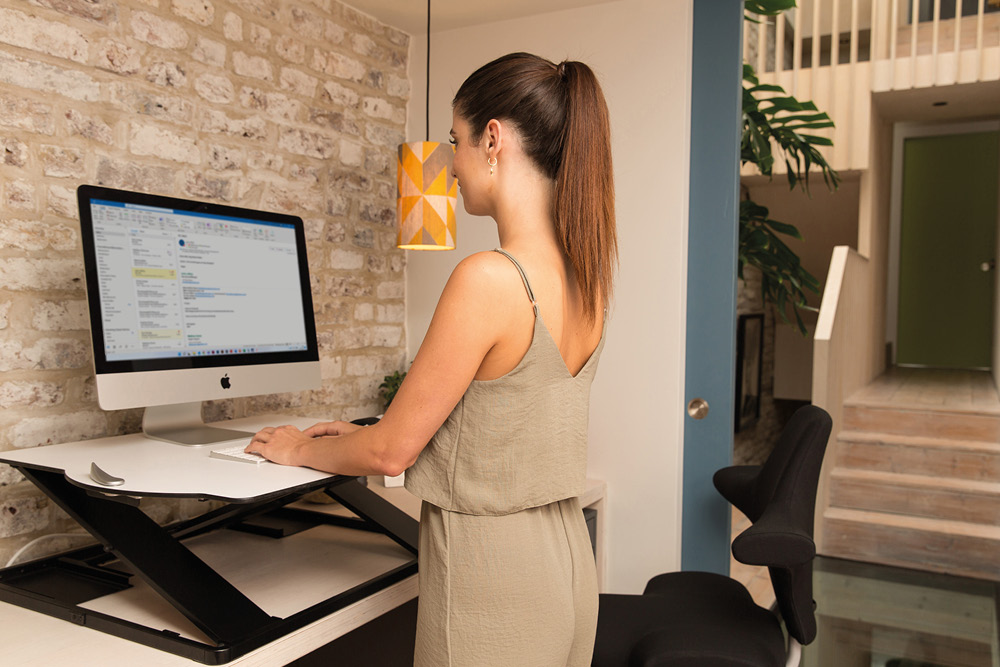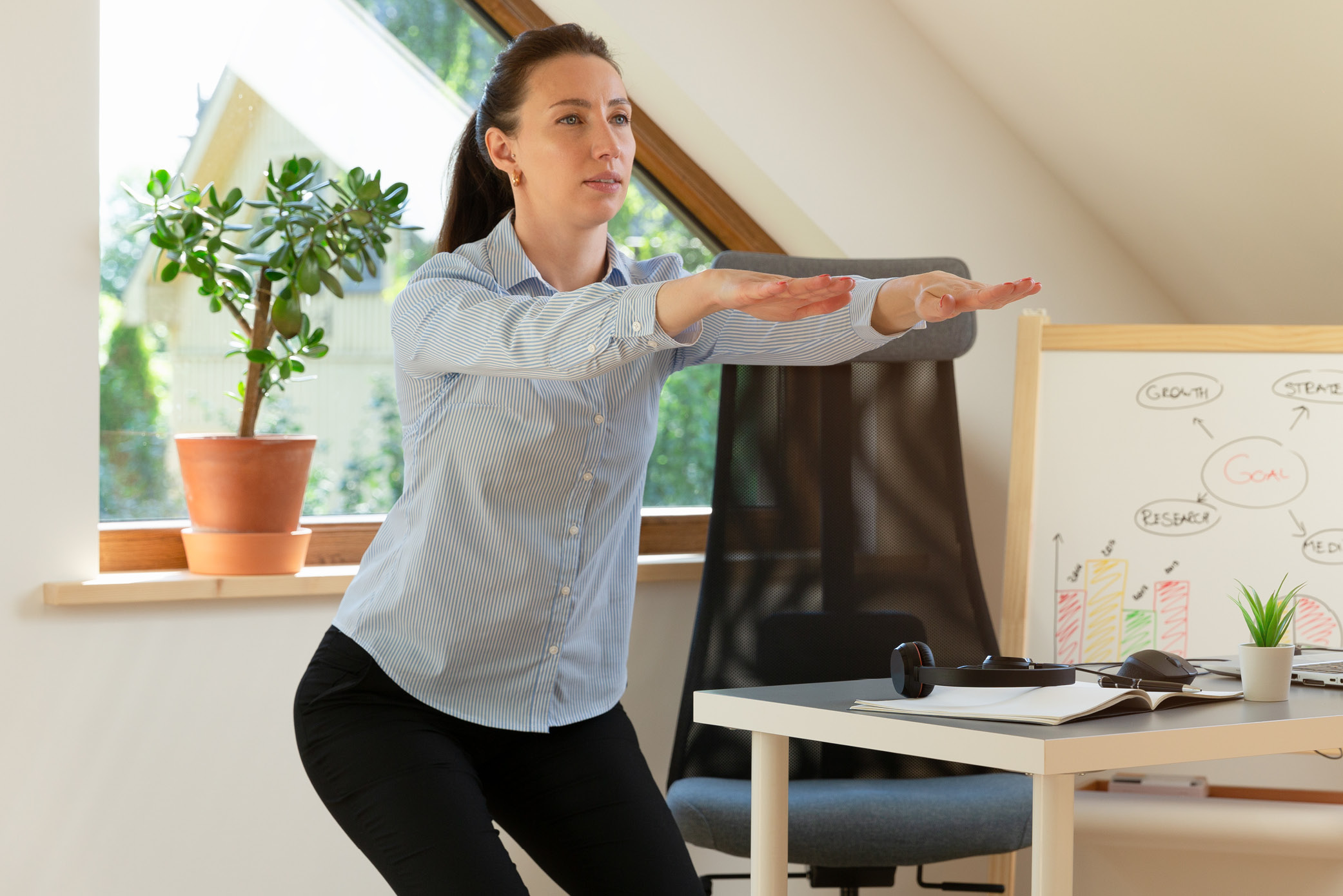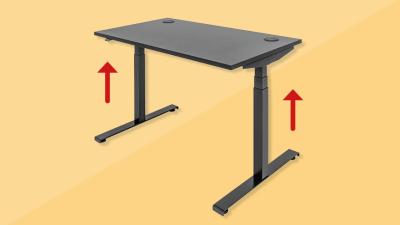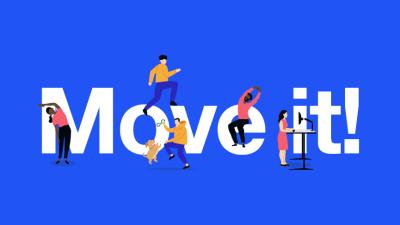
It’s official - taking short breaks and moving around while working is good for you. Workplace wellbeing experts - including those at Posturite - recommend a ‘sit less, move more’ approach 1.
Movement is important, and not only because it’s good for your muscles, joints, circulation, eyes and mental health. Your breaks when working from home aren’t skiving; they will help improve your mental agility and reduce your error rate - all good for business.
But to what extent are employers supportive of active working and do some homeworkers get anxious about a need to constantly prove productivity in these Covid times of 2022? After all, nobody wants to or can afford to be perceived as a skiver.
I spoke to Posturite’s lead ergonomic consultant, Katharine Metters, to get her thoughts on the subject.
Anxiety and miscommunication: The current situation
When Katharine visits clients (in between Covid lockdowns), she asks employees if they are encouraged to move around when working and to take short breaks. They often reply that no, ‘My manager wouldn’t like that’. Katharine would then raise this for discussion with their manager and the reply would often be ‘Rubbish! I know the importance of taking breaks and active working, they know they can take breaks’. So it appears there is a damaging assumption by staff that just because the manager hasn’t overtly communicated their support for breaks and active working, they are not happening.
“I think we need to be very clear on expectations for employees” says Katharine. “I think one of the biggest problems we have is people may be overworking because they’re worried that others may think they might be skiving. If managers can give clear expectations, then people can plan their days appropriately, ensure they’re working in a healthy way that suits them, and have the reassurance that they’re achieving what their boss expects of them.”

Katharine advises that each one of us “Looks for opportunities to undertake tasks away from our desks. So if you’re reading a document, move away from your desk, go and sit on your sofa, go for a walk whilst thinking things through. Hold a phone call while standing up or moving around.”
What is a 'microbreak'?
A microbreak is a short, 30 second to two-minute break taken frequently throughout the working day, allowing for movement, change of position and a few deep breaths. These short breaks are good for the body, eyes and mind. Employees should feel able to take microbreaks without fear of judgement, knowing that they will ultimately benefit both them personally and the company.
Have a conversation with your boss about their expectations of you. Do they expect you to always respond immediately to Microsoft Teams messages, emails and phone calls, or actually are they happy that you use your judgement?
After all, it’s easy to prove you’re not skiving – by doing good work, delivering it on time and getting results.
As I write this blog, I stop to walk down two flights of stairs to answer the door to my next-door-neighbour and that two-minute doorstep chat and tiny piece of exercise and social contact is good for both my physical and mental health. (It was the fun neighbour, not the annoying one…)
If I was at the office, I would have spent some ‘watercooler’ time socialising too, as well as visiting other departments for meetings, travelling to visit clients and despairing of my misbehaving hair in the bathroom mirror. It’s expected that a similar amount of time will be away from a desk when working from home too. And if you’re anything like me, your best ideas come when you’re away from your desk anyway.

Why should you take regular microbreaks?
Here are just a few of the many different benefits of microbreaks:
- They provide postural breaks
- They give your brain a rest
- They create time to process knowledge
- They increase accuracy
- They boost your feeling of positivity
- They help you concentrate when you return
- They lower the risk of aches and pains
- They decrease mental fatigue
- They increase blood and oxygen circulation
- They can help with blood sugar control
The Harvard Business Review puts forward the view that ‘Regular Exercise Is Part of Your Job’. “Studies indicate that our mental firepower is directly linked to our physical regimen. And nowhere are the implications more relevant than to our performance at work.” Are you firing on all cylinders at work? Try taking healthy microbreaks in between these periods of top performance.

Is employee surveillance effective?
What is your view on employee monitoring and productivity software? The issues are discussed in this People Management article. I think it sounds horrific, but then I’m not a CEO needing to deliver profit to shareholders. “If some people are genuinely underperforming, skiving or watching Homes Under the Hammer, then deal with them through the performance management route, but don’t subject good workers to unnecessary surveillance,” says Gemma Dale, HR specialist and lecturer at Liverpool John Moores University, in the article. “Constantly watching your workforce is a failure of leadership,” she adds. “It is essentially admitting that you can’t motivate or inspire people to do their best, and that you can only get them to work when you are watching them.” It’s a breakdown of trust.
“Employee wellness is a business tool to make sure businesses are profitable, but it is also the fulfilment of a company’s duty of care to their staff” says ergonomist Katharine Metters. “Many people in UK businesses have seen deterioration in their staff’s wellbeing due to Covid and the penny is dropping that action needs to be taken.”
Katharine also points out that video communication does not suit everyone, and it can make some people anxious to the extent that it reduces their input:
“There are some people who are more introverted and have become rather hidden at work during this pandemic. They often prefer to turn their cameras off and thus frequently get overlooked in video meetings. Their opinions not being heard in one meeting can then spiral into feeling that their views are not really valued at all and they start to contribute even less. Losing colleagues’ input can have significant negative effect on a business and it is therefore vital to help people with their confidence. Video meetings should be chaired and managed effectively to ensure that all participants are included. This is taking care of the health of the business as well as the health of your employees.”
How employers can take action
The CIPD (Chartered Institute of Personnel and Development) carried out a 2021 Health and Wellbeing at Work Survey and found that more than 80% of organisations were concerned about the impact of Covid on employees’ mental health.
If you share that concern, take the time to have specific chats with your colleagues about their wellbeing and how they’re coping with the pandemic. If you’re a line manager and your team members are working from home, let them know what you expect from them and that you trust them to carry out their work effectively. Explain that you want them to be happy in their work. We all love to be treated as an individual and not just a producer of a job. If there has been a reduction in workforce due to redundancies, take care of those remaining – at all levels of seniority.
As well as encouraging moving around and taking microbreaks, demonstrate that you care about your team members’ health by also checking how comfortable their homeworking setups are. This will not only help your staff work effectively, but will meet your legal obligation to control risks to your staff - no matter where they are working. If you know that morale is low in your organisation but lack the time to tackle it, a specialist workplace wellbeing company can take care of many aspects for you.
When you feel valued, you do your best work.
Katharine Metters is Lead Consultant, Ergonomics, at Posturite and is a Member of the Chartered Society of Physiotherapy (MCSP), a Member of the Chartered Institute of Ergonomics and Human Factors (MCIEHF), a Chartered Member of the Institution of Occupational Safety and Health (CMIOSH) and a Member of the Centre for Registration of European Ergonomists (CREE).











